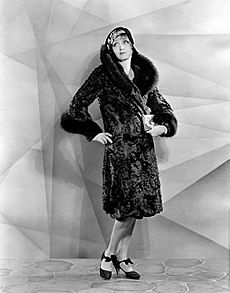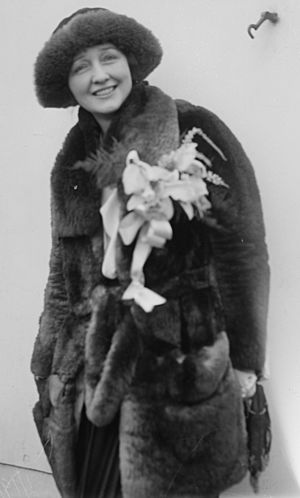Hedda Hopper facts for kids
Quick facts for kids
Hedda Hopper
|
|
|---|---|
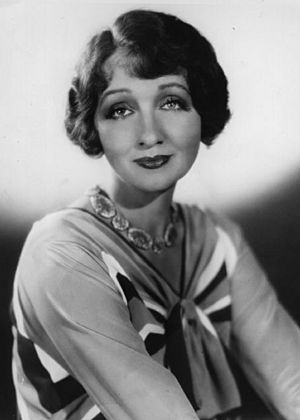
Hopper in 1930
|
|
| Born |
Elda Furry
May 2, 1885 |
| Died | February 1, 1966 (aged 80) Los Angeles, California, U.S.
|
| Resting place | Rose Hill Cemetery in Altoona, Pennsylvania |
| Occupation | Actress, gossip columnist |
| Years active | 1908–1966 |
| Known for | Writing "Hedda Hopper's Hollywood" |
| Political party | Republican |
| Spouse(s) |
DeWolf Hopper
(m. 1913; div. 1922) |
| Children | William Hopper |
Hedda Hopper (born Elda Furry; May 2, 1885 – February 1, 1966) was an American actress and a famous gossip columnist. She wrote about the lives of Hollywood stars. At her most popular in the 1940s, about 35 million people read her column.
Hopper strongly supported the House Un-American Activities Committee (HUAC) hearings. She often named people she thought were Communists and was a big part of the Hollywood blacklist. This blacklist stopped many people from working in movies. Hedda Hopper kept writing gossip until she passed away. Her work appeared in many magazines and on the radio. She had a long-running rivalry with another famous gossip columnist, Louella Parsons.
Contents
Early Life of Hedda Hopper
Hedda Hopper was born Elda Furry in Hollidaysburg, Pennsylvania. Her parents were Margaret and David Furry, who was a butcher. Her family had German roots from Pennsylvania. When Elda was three years old, her family moved to Altoona.
Hedda Hopper's Career Journey
Becoming an Actress
Elda ran away to New York City to become an actress. She started her career dancing in the chorus on Broadway. At first, she wasn't very successful. A famous producer, Florenz Ziegfeld, even called her "clumsy."
After a few years, she joined the theater group of a popular actor named DeWolf Hopper. She called him "Wolfie." She later married him. Elda stayed in the chorus and toured the country. She wanted to be a real actress, not just a dancer. She got an audition for a play called The Country Boy and won the main role. This show toured for 35 weeks across 48 states.
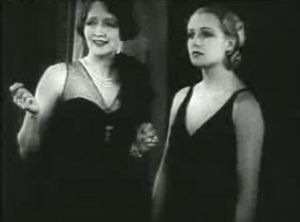
In 1913, she became DeWolf Hopper's fifth wife. His previous wives had similar names, which sometimes caused confusion. So, Elda paid a numerologist $10 to find a new name for her. The answer was "Hedda."
She started acting in silent movies in 1915. Her first movie was The Battle of Hearts (1916). She became well-known for playing wealthy women. In one film, Virtuous Wives (1918), she spent all her $5,000 salary on fancy clothes. She wore these clothes in the movie to stand out more than the main star. By 1920, she was earning $1,000 a week. In 1923, she moved to Hollywood. She appeared in over 120 movies during her 23-year acting career.
Starting Her Column
As Hedda's acting career slowed down in the mid-1930s, she looked for new ways to earn money. In 1935, she started writing a weekly Hollywood gossip column. It was for The Washington Herald and paid $50 a week. But it was canceled after four months because she wouldn't take a pay cut.
In 1937, she got another chance to write a gossip column for the Los Angeles Times. Her column, "Hedda Hopper's Hollywood," began on February 14, 1938. Hedda couldn't type or spell well. So, she would tell her column to a typist over the phone. She used her many friends and contacts from her acting days to find stories.
Hedda was known for wearing very fancy hats. The government even gave her a $5,000 tax credit each year for them. During World War II, the Nazis used pictures of Hedda in her hats for propaganda. They showed her as a symbol of "American decadence." Hedda earned $250,000 a year. This allowed her to live a very fancy life in a large house in Beverly Hills. She called her house "the house that fear built."
Hedda was a big supporter of actress Joan Crawford. Joan's career struggled in the early 1940s. Hedda helped Joan win an Oscar for her movie Mildred Pierce in 1945. Hedda's support was seen as the first time someone tried to influence the Oscar voting.
Actress ZaSu Pitts once compared Hedda to a "ferret." Another actress, Joan Bennett, sent Hedda a skunk as a Valentine's Day gift! Hedda reportedly said the skunk was very well-behaved. She named it Joan and later gave it to actor James Mason.
During World War II, Hedda's only child, William Hopper, served in the Navy. Hedda criticized Douglas Fairbanks Jr., thinking he wasn't doing his duty. But Fairbanks Jr. was already serving in the Navy. He later wrote that he disliked Hedda for her comments.
In 1963, Hedda complained in her column that most Oscar nominees for Best Actor were British. She joked that they practiced Hamlet to avoid the bad weather in England.
Rivalry with Louella Parsons
When Hedda first came to Hollywood, she and Louella Parsons helped each other. Hedda was an actress, and if anything interesting happened on a movie set, she would tell Louella. In return, Louella would mention Hedda in her column.
After Hedda's acting career slowed, she became a columnist. Her column was picked up by the Los Angeles Times. Hedda first beat Louella to a big story when she reported the divorce of the president's son, Jimmy Roosevelt. This news became a huge story across the country.
Citizen Kane Controversy
When rumors spread that Orson Welles' movie Citizen Kane was about newspaper owner William Randolph Hearst, Louella Parsons met with Welles. She believed his denials. But Hedda Hopper saw an early screening of the film. She wrote a very harsh review, calling it an "attack on a great man."
Because of Hedda's review, Hearst was angry with Louella for not telling him about the movie. Louella then demanded to see the film. She threatened the movie studio, RKO, with lawsuits and other problems if they released Kane. She also warned other studio heads that she would reveal secrets about people in Hollywood.
The movie's premiere was canceled. Other movie theaters were afraid of Hearst and refused to show the film. Even though some people supported the movie, it lost money. Louella Parsons was not the only one against Citizen Kane, but her actions certainly hurt the film.
Ingrid Bergman Story
In the early 1950s, Louella Parsons reported that actress Ingrid Bergman was pregnant. Bergman had left her husband to live in Italy with director Roberto Rossellini. Bergman was known for playing an angelic nun in The Bells of St. Mary's.
Hedda Hopper had supported Bergman and believed her denial about being pregnant. Hedda printed a strong denial in her column. However, Bergman was indeed pregnant. Hedda was furious at being wrong and launched a public campaign against Bergman. She criticized Bergman for being pregnant outside of marriage. Louella reportedly got the tip from Howard Hughes, who was upset with Bergman.
The Rivalry's Impact
Some people say Hedda saw the rivalry as fun and good for business. But Louella took it very personally. It's believed that studio bosses like Louis B. Mayer helped Hedda become a columnist. They hoped she would balance Louella's power. Gossip columnist Liz Smith said, "The studios created both of them. And they thought they could control both of them. But they became Frankenstein monsters escaped from the labs." Hedda and Louella together had 75 million readers.
Hedda Hopper's Political Views
Hedda Hopper was a very strong Republican. In the 1944 election, she spoke at a huge rally in Los Angeles. She supported the Republican candidates. This event had 93,000 people and included famous names like Walt Disney and Ronald Reagan. Even with this support, most Hollywood stars publicly supported the other party.
Hopper strongly backed the House Un-American Activities Committee (HUAC) hearings. She also spoke at the 1956 Republican National Convention. She was so well-known for her conservative views that a rumor spread. It said she would walk out of the 1951 Oscar ceremony if a socialist actor won. The rumor wasn't true, but Hedda joked she wished she had thought of it. A screenwriter once told Hedda that some people called her a "Nazi" because of her strong views. Hedda reportedly cried and said she only wanted to be a "good American."
The Hollywood Blacklist
Hedda Hopper was a major force behind the Hollywood blacklist. This list stopped people from working in the entertainment industry. She used her column, read by 35 million people, to hurt the careers of those she suspected. This included people thought to be Communists, or those with Communist sympathies. She also targeted people who were homosexual or who she thought lived immoral lives. She was a key member of a group called the Motion Picture Alliance. This group was formed in 1944 to find suspected Communists in Hollywood. Hedda saw herself as a protector of moral standards in Hollywood.
One person Hedda targeted was screenwriter Dalton Trumbo. He was blacklisted for years because of Hedda's constant negative articles about his Communist Party membership. When actor Kirk Douglas hired Trumbo to write the movie Spartacus (1960), Hedda spoke out against it. She wrote that the script was by a "Commie" and told people not to see it. However, the film was a big success. Hedda also targeted Charlie Chaplin and Ingrid Bergman.
Radio and Television Appearances
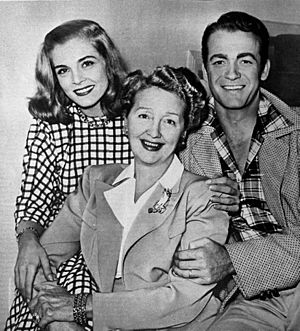
Hedda Hopper also acted in a radio soap opera called Brenthouse in 1939. She then started hosting her own radio show, The Hedda Hopper Show, in November 1939. It was on CBS three times a week. She later moved to ABC and then back to CBS for other shows.
In 1950, she hosted a 30-minute variety show on NBC. It featured music, talks, and scenes from movies with famous guests. On January 10, 1960, a TV special called Hedda Hopper's Hollywood aired. Hedda hosted it and interviewed many stars. These included Lucille Ball, Walt Disney, and James Stewart.
Hedda also made several cameo appearances as herself in movies. These included Sunset Boulevard (1950) and The Patsy (1964). She also appeared in TV shows like I Love Lucy and The Beverly Hillbillies. She wrote two autobiographies: From Under My Hat (1952) and The Whole Truth and Nothing But (1962). She continued writing daily and Sunday columns for newspapers until she died. She also wrote for celebrity magazines.
Personal Life
On May 8, 1913, Hedda married actor and singer DeWolf Hopper in New Jersey. They had one child, William. William later became an actor, famous for playing Paul Drake in the Perry Mason TV series. Hedda and DeWolf divorced in 1922.
Later Years and Legacy
Hedda Hopper passed away on February 1, 1966. She was 80 years old and died from pneumonia in Los Angeles. Her estate was valued at over $300,000. She is buried in Rose Hill Cemetery in Altoona, Pennsylvania.
For her contributions to the movie industry, Hedda Hopper has a star on the Hollywood Walk of Fame. It is located at 6313½ Hollywood Boulevard in Hollywood.
Images for kids
See also
 In Spanish: Hedda Hopper para niños
In Spanish: Hedda Hopper para niños
- Jimmie Fidler
 | Victor J. Glover |
 | Yvonne Cagle |
 | Jeanette Epps |
 | Bernard A. Harris Jr. |


